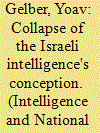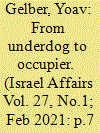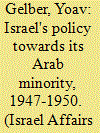| Srl | Item |
| 1 |
ID:
123178


|
|
|
|
|
| Publication |
2013.
|
| Summary/Abstract |
This article attempts to contradict the commonly accepted assumption in Israel and the West that in April-May 1973 Egypt and Syria were about to open war against Israel and were deterred by a series of measures that Israel took, including partial mobilization of the Israel Defence Force (IDF) reserves. The article ventures to separate the apologetics and (flawed) memories from the information provided by the now available documentary evidence. After presenting the prevailing Israeli version, the article analyses the memoirs on the Egyptian side about the preparations for war and determining D-Day, to refute this version. Based on the contemporary protocols of government and general staff meetings and political-military consultations, it argues that the Israeli government, general staff and intelligence community did not regard at the time the outbreak of war as an imminent threat. The steps they took concerned the medium and long run, and were irrelevant in the short run. Similarly, the mobilization of reserves was not connected to the alarm of war but to the Day of Independence parade in Jerusalem. The article claims on the basis of these protocols that the reason for the excitement was the collapse of the Israeli intelligence's conception that Egypt would not resume hostilities before it could hit at the interior of Israel, and Syria would not go to war without Egypt. The arrival of Libyan Mirages and Iraqi Hunters to Egypt in April fulfilled this condition and the possibility of war could not be dismissed offhand. Israel responded to the new situation by the book. It shared the information and analysis with the White House and the CIA; it refreshed the IDF planning down to the divisional level and the IDF general staff held a series of thorough discussions to estimate the situation. The bottom line of this process was a government directive to the IDF to prepare for war at the end of the summer of 1973 (as it actually happened). In the latter portion of the article I explain why this directive was ignored when it was put to test in late September and early October of 1973.
|
|
|
|
|
|
|
|
|
|
|
|
|
|
|
|
| 2 |
ID:
177566


|
|
|
|
|
| Summary/Abstract |
The purpose of this article is to show that most problems that Israel has faced in the public opinion domain in recent decades were evident already in the wake of the Six Day War. Israel either ignored or miscomprehended their significance. While it has become a struggle over the consciousness of the world in general, and the younger generations in Israel and abroad in particular, Israel treated it as a problem of internal and external ‘Hasbara’ (explaining) and has been unprepared and ill equipped to cope with it.
|
|
|
|
|
|
|
|
|
|
|
|
|
|
|
|
| 3 |
ID:
118381


|
|
|
|
|
| Publication |
2013.
|
| Summary/Abstract |
In the absence of preconceived strategies - despite several pre-state attempts to prepare blueprints for tackling the Arab problem - Israel's early Arab policy was shaped in a process of trial and error, fluctuating between ideological aspirations and good intentions (or wishful thinking) and the needs on the ground: the 1948 war and its consequences, the wide-open borders and regular infiltration, and the fear of a second comprehensive war with the Arab states.
|
|
|
|
|
|
|
|
|
|
|
|
|
|
|
|